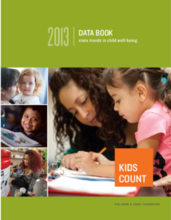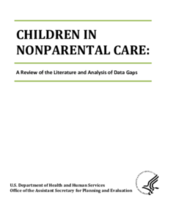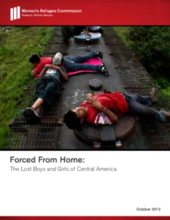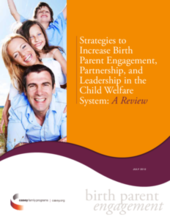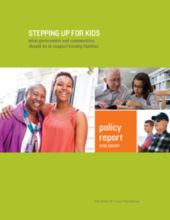Displaying 2051 - 2060 of 2153
The 2013 KIDS COUNT Data Book provides a detailed picture of how children are faring in the United States. In addition to ranking states on overall child well-being, the Data Book ranks states in four domains: Economic Well-Being, Education, Health, and Family and Community.
The Action Plan on Children in Adversity is the first government wide strategic guidance for U.S. Government international assistance for children. The goal of the Action Plan is to achieve a world in which all children grow up within protective family care and free from deprivation, exploitation, and danger. It has three principal objectives, with Objective 2 specifically focusing on the importance of promoting family care and prevention of family-child separation.
This literature review summarizes the research on children who live apart from their parents and identifies gaps in knowledge regarding this vulnerable population. This literature review was developed as a step toward designing the National Survey of Children in Nonparental Care, a nationally representative telephone survey of adults caring for these children.
This paper provides insight into child protection in the context of coordinated action, the architecture of U.S. government assistance, the state of evidence-base, development of appropriate research framework, practice and policy, ethical considerations, and capacity development and knowledge transfer for those advocating for children outside of family care. Recommendations are made to consider how current operational contexts, collaborative relationships and learning-knowledge can be united to focus on the various categories of children outside of family care.
Recognizing the need for evidence to inform policies, strategies, and programs to care for vulnerable children, the U.S. Government convened an Evidence Summit on Protecting Children Outside of Family Care on December 12–13, 2011, in Washington, D.C., USA. This paper summarizes the background and methods for the acquisition and evaluation of the evidence used to achieve the goals of the Summit.
This report from the Women’s Refugee Commission describes the recent increase in migration of unaccompanied children from Central America to the United States and provides an overview of the situation of these children, including the factors that motivate their migration - primarily the violence they experience in their home countries.
As an outgrowth of Casey’s ongoing work with birth parents, Research Services and Technical Assistance Unit collaborated to review strategies and programs that increase birth parent engagement with child welfare services and that develop effective child welfare partnerships with birth parents as mentors, leaders and advisers.
This article focuses on a central problem of foster care, which is that it is often not developmentally informed.
This report from the Annie E. Casey Foundation assesses the practice of kinship care within the United States, reflecting upon the widespread use of this care practice, the complexities facing families involved in this form of care and the interventions and supports proven to assist in its success. While specific to the United States, discussions and recommendations can be assessed for application in other global settings.
The study is designed to identify whether effective caregiving mirrors strong parenting among typical parents or whether a set of additional skills is required to parent foster children responsively. Some of the principle features of quality caregiving for children are described particularly in the domains of family integration, relationships with biological parents, and support for children's special needs.

